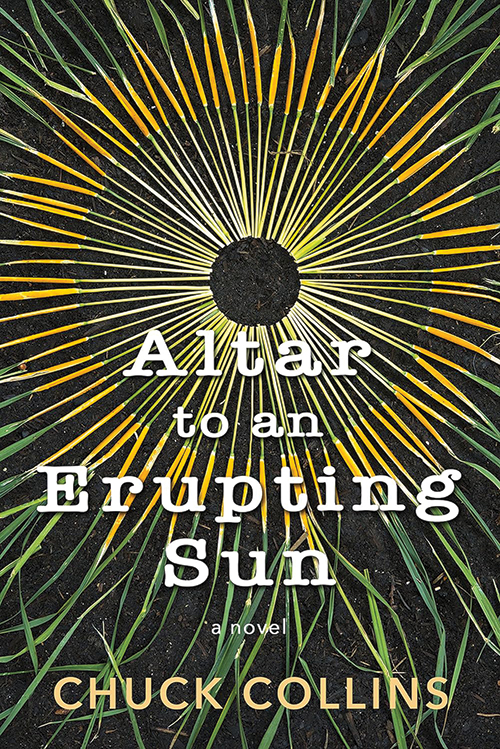
Altar to an Erupting Sun
Reviewed by Ruah Swennerfelt
April 1, 2024
By Chuck Collins. Green Writers Press, 2023. 330 pages. $19.95/paperback; $9.99/eBook.
If you are about my age—mid-70s—this book will possibly take you back to a point in your life when you realized that you were responsible for taking action, when and whenever it was needed. If you are younger, this book may help you understand the stresses and uncertainties that your elders experienced in the turbulent times of the 1960s and beyond.
In this book of fiction, author Chuck Collins (who came of age in the late 1970s) challenges the reader to contemplate the rights and wrongs of different acts or methods of civil disobedience, and to ask the difficult questions of how much one is willing to risk in order to stop the terrifying destabilization of Earth’s fragile community of life. The reader follows the emerging radicalization of the main character, Rae Kelliher, from her 20s through to her death.
The book opens at the end of Rae’s long life with her decision to commit a drastic and violent act in a desperate attempt to stop what she considers to be a greater evil. This was prompted by her fury after learning that the Big Oil companies had long known about the catastrophic effects of climate change and the role of their products in creating it but had done nothing to prevent it. After much discernment, Rae decides to kill an oil company executive by detonating an explosive device concealed in her clothing. Although the path to her principled action is clear to her, it baffles and bewilders her friends and many in the peace community. As the effect of this shocking murder–suicide ripples throughout the peace and activist community, readers are given the opportunity to explore their own reactions and feelings about whether Rae’s decision could be justified or how it might ultimately set back the environmental movement.
The book then goes back some decades to share her story, beginning with the many influences along her path to radical action. This includes living in communities in western Massachusetts and southern Vermont, where she learns about simple living and caring for the land. Rae travels to Central America with Witness for Peace, risks arrest at the School of the Americas, and engages in many more public demonstrations over the decades. She is also influenced by the story of Dietrich Bonhoeffer, a German theologian and pacifist who had joined one of several plots to assassinate Adolf Hitler and was eventually arrested and executed by the Nazis. This raised many questions for Rae since she considered herself a pacifist.
The book is divided into the stages of Rae’s political and social awakening, starting with formation and including but not limited to resistance, discipleship, and reckoning. She is greatly influenced by Quakers, and throughout the book, Quaker values are lifted up, along with the exemplary lives of many Quaker elders. Wally and Juanita Nelson, real people who lived and farmed at the Woolman Hill Quaker Retreat Center in western Massachusetts, provide support and guidance to the fictional Rae. Collins also puts Rae into a relationship with another real person, Brian Willson, who lost his legs at a peace demonstration when an oncoming train carrying weapons bound for Central America didn’t stop.
Collins brilliantly and seamlessly intersperses real and fictional people throughout the book, lending a feeling that what the reader is experiencing is all real history. Having lived in New England for about 50 years, I have attended a number of the demonstrations and protests mentioned in this book, or ones very similar, so it all felt very real and personal to me.
The author has had his own journey of radical witness. As the great-grandson and heir of Oscar Mayer of hot dog fame, Collins gave away his inheritance to deserving organizations, understanding how damaging income and wealth inequality is in a society. Over several decades, he has been an inspiration to many for his work to bring about a sane and healthy planet. I am personally grateful for the light that his book sheds on the challenges and dilemmas that he faced as he charted his own course as an environmental activist.
Ruah Swennerfelt is a member of Middlebury (Vt.) Meeting, where she serves on the Earthcare Committee and also serves on New England Yearly Meeting’s Earth Quaker Justice Team. She is a coordinator of Sustainable Charlotte Vermont, a transition initiative. She and her husband homestead on the unceded lands of the Abenaki.



Comments on Friendsjournal.org may be used in the Forum of the print magazine and may be edited for length and clarity.